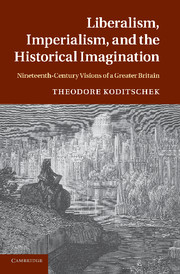 Liberalism, Imperialism, and the Historical Imagination
Liberalism, Imperialism, and the Historical Imagination Book contents
- Frontmatter
- Contents
- Acknowledgements
- List of abbreviations
- Introduction
- 1 Imagining Great Britain: Union, Empire, and the burden of history, 1800–1830
- 2 Imagining a British India: history and the reconstruction of Empire
- 3 Imagining a Greater Britain: the Macaulays and the liberal romance of Empire
- 4 Re-imagining a Greater Britain: J. A. Froude: counter-romance and controversy
- 5 Greater Britain and the “lesser breeds”: liberalism, race, and evolutionary history
- 6 Indian liberals and Greater Britain: the search for union through history
- Epilogue: From liberal imperialism to Conservative Unionism: losing the thread of progress in history
- Index
- References
Introduction
Published online by Cambridge University Press: 04 April 2011
- Frontmatter
- Contents
- Acknowledgements
- List of abbreviations
- Introduction
- 1 Imagining Great Britain: Union, Empire, and the burden of history, 1800–1830
- 2 Imagining a British India: history and the reconstruction of Empire
- 3 Imagining a Greater Britain: the Macaulays and the liberal romance of Empire
- 4 Re-imagining a Greater Britain: J. A. Froude: counter-romance and controversy
- 5 Greater Britain and the “lesser breeds”: liberalism, race, and evolutionary history
- 6 Indian liberals and Greater Britain: the search for union through history
- Epilogue: From liberal imperialism to Conservative Unionism: losing the thread of progress in history
- Index
- References
Summary
Four months after Adam Smith published his Wealth of Nations, the American Declaration of Independence put it to the test. The British Empire, which had risen with the mercantilist system of privilege and protectionism, now seemed to have joined that system in a spiral of mutual collapse: free trade, Smith had argued, would bring economic growth, social advancement, and political autonomy for colonies. So it transpired, over the next few generations, that Britain found a far better trading partner in the United States than she had ever possessed with her thirteen colonies. Like individuals, nations seemed to be learning that their enlightened self-interest was to respect the rights of others. On both levels, this required equality before the law, which, in turn, seemed to precipitate a further installment of benefits and liberties. If “liberalism” is thus defined as a loose constellation, encompassing free trade, free labor, free association, free press, and formal equality, then it is safe to say that by the middle of the nineteenth century, Britain had gone quite far toward becoming a liberal society. And yet these liberties were not always what they seemed. Free trade might mean freedom to starve. Free labor could be the freedom to be exploited. Equality appeared to be for propertied white men alone. Freedom of press and association were too often honored in the breach. And yet of all these contradictions, the most glaringly obvious was that the British Empire had not disappeared.
- Type
- Chapter
- Information
- Liberalism, Imperialism, and the Historical ImaginationNineteenth-Century Visions of a Greater Britain, pp. 1 - 16Publisher: Cambridge University PressPrint publication year: 2011
